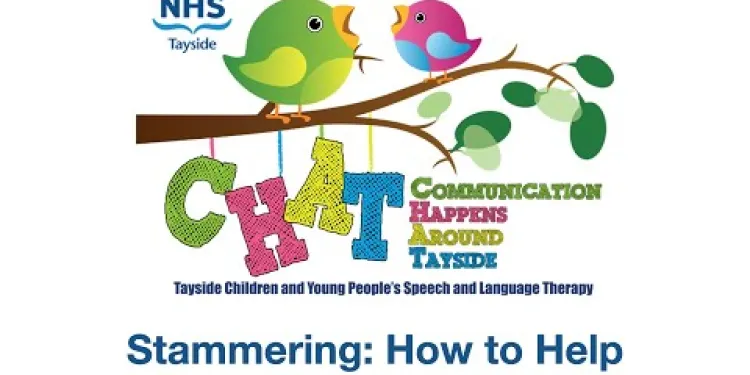Find Help
More Items From Ergsy search
-

Giving Voice - Stammer and Fluency Problems
Relevance: 100%
-

Stammering: myths about the cause of stammering
Relevance: 62%
-

Stammering: How to Help
Relevance: 61%
-

My Stammering Child
Relevance: 60%
-

Adam's story on stammering - Therapy
Relevance: 59%
-

Will's story on having therapy - Stammering
Relevance: 58%
-

I don’t need to be fixed – what I wish the world understood about stammering
Relevance: 53%
-

Stammering myth 4: You should ignore a child's stammer
Relevance: 50%
-

Why do some children stammer?
Relevance: 49%
-

Practical strategies to support young children who stammer
Relevance: 41%
-

Can a concussion cause memory problems?
Relevance: 27%
-

Can Ozempic cause gallbladder problems?
Relevance: 25%
-

Is sewage a problem on UK beaches?
Relevance: 25%
-

What health problems can HPV cause?
Relevance: 24%
-

Can relationship problems be resolved to improve mental health?
Relevance: 24%
-

Why is antibiotic resistance a problem?
Relevance: 23%
-

What problems is Ozempic known to cause?
Relevance: 22%
-

What should I do if I experience problems with my Turkey Teeth?
Relevance: 22%
-

Can health-related anxiety lead to actual health problems?
Relevance: 21%
-

How significant is the water loss problem in the UK?
Relevance: 21%
-

Can high blood pressure lead to other health problems?
Relevance: 19%
-

Problems swallowing pills: Pop bottle technique | NHS
Relevance: 18%
-

Problems swallowing pills: Lean forward technique | NHS
Relevance: 18%
-

Can Lyme disease cause long-term health problems?
Relevance: 18%
-

What is the risk of heart problems with Ozempic?
Relevance: 16%
-

Bridging Finance Dangers - Tips on common problems, risks and lending rules in the UK
Relevance: 16%
-

What should I do if I encounter problems after my hair transplant in Turkey?
Relevance: 13%
-

Are there psychological impacts of menopause that affect cognitive health?
Relevance: 13%
-

NHS Looking after your feet - Podiatrist https://youtu.be/8J1v6K21ykc
Relevance: 9%
-

Diabetes Care - Preventing Amputations
Relevance: 9%
-

What are common symptoms of a concussion?
Relevance: 8%
-

What types of self-tests are available for eye patients?
Relevance: 8%
-

Can customers report issues with water infrastructure?
Relevance: 8%
-

Can Ozempic affect vision?
Relevance: 8%
-

Are there any complications associated with shingles?
Relevance: 8%
-

What are common symptoms of Lyme disease?
Relevance: 8%
-

What are the less common but serious side effects of weight loss drugs?
Relevance: 7%
-

Is professional pest control needed for spiders?
Relevance: 7%
-

Are there common side effects that fake weight loss drugs may cause?
Relevance: 7%
-

Can I skip getting a surveyor's report if I'm buying a new-build home?
Relevance: 7%
Giving Voice - Stammer & Fluency Problems
Understanding Stammering
Stammering, also known as stuttering, is a complex speech disorder characterized by disruptions in the fluency of verbal expression. It can manifest as repetitions of sounds, syllables, or words, prolongations of sounds, and involuntary pauses. Stammering affects around 1% of the UK population, with higher prevalence in children. While many outgrow the condition, some continue to face challenges into adulthood.
Impact on Daily Life
Stammering can significantly affect an individual's quality of life. It often contributes to a lack of confidence, anxiety, and social challenges. Children and adults who stammer may face bullying or misunderstanding, which can further exacerbate their speech fluency problems. It is vital to understand that stammering is not a sign of cognitive deficit; people who stammer are capable and intelligent.
Causes and Contributing Factors
While the exact cause of stammering is still unknown, research suggests a combination of genetic, developmental, neurophysiological, and environmental factors. Family history often plays a role, and emotional stress can aggravate the symptoms. Early diagnosis and intervention are crucial for effective management.
Therapeutic Approaches
Various therapies can help manage stammering. Speech and language therapy (SLT) is the most common intervention, focusing on techniques to improve speech fluency and communication skills. Cognitive-behavioural therapy (CBT) may also be beneficial, addressing the psychological aspects associated with stammering. Many public and private organisations in the UK provide specialised services to support individuals who stammer.
Support and Resources
Support groups and organisations such as the British Stammering Association (BSA) offer valuable resources, guidance, and community support. Raising awareness and encouraging open conversations about stammering can help reduce stigma and promote understanding. It is essential to foster inclusive environments where individuals with fluency disorders feel supported and empowered.
Conclusion
Stammering is a multifaceted speech disorder that can affect individuals across all age groups. Understanding the challenges and providing appropriate support and therapy can significantly improve the quality of life for those who stammer. With continued research, awareness, and compassion, we can give voice to those facing stammering and fluency problems in the UK.
Giving Voice - Stammer & Fluency Problems
Understanding Stammering
Stammering is when speaking can be hard. It is also called stuttering. People who stammer may repeat sounds, take long pauses, or get stuck on words. About 1 out of every 100 people in the UK have this problem, especially children. Some kids stop stammering as they grow up, but others may still have it when they are adults.
Impact on Daily Life
Stammering can make life harder. It can make people feel less confident, anxious, or nervous in social situations. Children and adults who stammer might get bullied or not understood by others. But it's important to know that stammering does not mean someone is not smart. People who stammer can be very capable and clever.
Causes and Contributing Factors
We do not know exactly why some people stammer. It might be because of family, growing up, how the brain works, or the environment. If parents or relatives stammer, it may run in the family. Stress can make stammering worse. Finding out early and getting help can make a big difference.
Therapeutic Approaches
There are ways to help people who stammer. Speech and language therapy (SLT) is very common. It helps people to speak more easily. Another helpful therapy is cognitive-behavioural therapy (CBT), which helps with the feelings related to stammering. In the UK, there are many groups that provide help for stammering.
Support and Resources
There are groups, like the British Stammering Association (BSA), that offer help and support. They have useful information and create a community where people can talk about their experiences. Talking about stammering helps others understand and stops bullying. It's important to create places where people who stammer feel welcome and supported.
Conclusion
Stammering can happen to anyone, no matter how old they are. By understanding, helping, and using therapy, we can improve the lives of people who stammer. By researching and being kind, we can help people talk about their stammering and feel confident in the UK.
Frequently Asked Questions
What is stammering?
Stammering, also known as stuttering, is a speech disorder characterised by interruptions in the flow of speech, such as repetitions, prolongations, or blocks of sounds, syllables, words, or phrases.
What causes stammering?
The exact cause of stammering is not fully understood, but it is believed to result from a combination of genetic, neurological, environmental, and developmental factors.
Can stammering be cured?
There is no outright cure for stammering, but various therapies and interventions can help manage and reduce the severity of the condition. Speech and language therapy is often very effective.
At what age does stammering typically begin?
Stammering usually starts between the ages of 2 and 5 years old, during the period when children are developing their speech and language skills.
Is stammering hereditary?
Stammering can run in families, suggesting a genetic component to the disorder. However, not everyone with a family history of stammering will develop the condition.
How common is stammering in the UK?
Approximately 1% of the UK population, or around 670,000 people, are affected by stammering. It is more common in males than females.
What are some common strategies for managing stammering?
Common strategies include slow and relaxed speech, breathing techniques, and practicing speech in non-stressful environments. Working with a speech and language therapist is highly recommended.
Does stammering affect a person's intelligence?
No, stammering does not affect a person's intelligence. It is solely a speech disorder and has no impact on cognitive abilities.
Can adults who stammer benefit from speech therapy?
Yes, adults who stammer can benefit from speech therapy. While early intervention is ideal, speech therapy can be effective at any age.
Is there a link between anxiety and stammering?
Stammering can lead to anxiety, especially in social situations. Additionally, anxiety can exacerbate stammering, creating a cycle that can be challenging to break.
How can teachers support students who stammer?
Teachers can support students who stammer by being patient, listening without interrupting, and providing a safe, supportive environment for them to express themselves without fear of judgement.
What should I do if my child is starting to stammer?
If your child is starting to stammer, seek advice from a speech and language therapist as early intervention can be very beneficial. Be supportive and patient, and avoid putting pressure on them to speak perfectly.
Are there support groups for people who stammer in the UK?
Yes, there are several support groups and organisations in the UK, such as the British Stammering Association, which offer resources and support for individuals who stammer and their families.
Can stammering impact career opportunities?
Stammering can impact career opportunities, particularly in roles that require a lot of verbal communication. However, many successful professionals who stammer have found effective ways to manage their speech in the workplace.
What role do parents play in helping a child who stammers?
Parents play a crucial role in helping a child who stammers by being patient, providing a supportive and non-judgmental environment, and seeking professional guidance from speech and language therapists.
What is stammering?
Stammering means having trouble when talking. Some words or sounds can be hard to say. You might pause, repeat sounds, or get stuck on words. It's okay! Lots of people have a stammer.
If talking is hard, try these tips:
- Speak slowly and take your time.
- Take a deep breath before speaking.
- Practice talking with a friend or family member.
There are people, like speech therapists, who can help make talking easier.
Stammering, or stuttering, is when a person has trouble speaking smoothly. Sometimes they might repeat sounds or words, or have pauses when speaking.
Why do people stammer?
We are not sure exactly why people stammer. It might be because of a mix of things like genes, how the brain works, the world around us, and how we grow up.
Can stammering be fixed?
Stammering means having trouble speaking smoothly. Some people find it hard to say words sometimes. It’s okay. Lots of people have this!
There is no quick fix for stammering, but there are ways to make it easier. Working with a speech therapist can help. They teach you tips and tricks to speak better. Practicing speaking slowly and calmly can also help.
Some people find talking softly or singing makes it easier to speak. You can try these tricks to see what works for you.
It's important to remember that everyone is different. What helps one person might not help another. Be patient and keep trying different things until you find what works best for you.
There is no way to make stammering go away completely, but there are different ways to help make it better. Seeing a speech and language therapist is often very helpful.
When do people usually start to stammer?
People often start to stammer when they are young. This can happen around 2 to 5 years old. If you or someone you know has trouble speaking, there are things that can help:
- Talk with a speech therapist. They help people speak more clearly.
- Practice speaking slowly with someone you trust.
- Use apps that have games and exercises to make speaking easier.
Stammering often begins when children are between 2 and 5 years old. This is when kids are learning to talk and understand words.
Do people get stammers from their parents?
Stammering might be passed down in families, which means it could be in your genes. But, not everyone who has family members that stammer will have the same problem.
How many people stammer in the UK?
Many people in the UK stammer when they talk. It is more common in children. Some adults stammer too.
Babies and young children might repeat sounds or words. Sometimes, this is called stammering. Most children stop stammering as they grow older.
For help with stammering, you can talk to a teacher, a speech therapist, or a doctor. They know ways to help.
About 1 out of every 100 people in the UK have a stammer. That's around 670,000 people. Stammering happens more often in boys than in girls.
How can I help with stammering?
Here are some helpful tips:
- Talk slowly and calmly. This can make speaking easier.
- Practice speaking with a friend. This can help you feel more confident.
- Take deep breaths before you talk. This helps you relax.
- Use simple words. This makes talking easier.
Tools you can use:
- Record yourself speaking. Listen to it and see how you can improve.
- Try speech therapy if you need more help.
Here are some ways to help with speech:
- Talk slowly and calmly.
- Try breathing exercises.
- Practice talking in places that are not stressful.
It is important to get help from a speech and language therapist. They are experts who can help you a lot.
Does stammering affect how smart a person is?
Stammering is when it's hard for someone to speak smoothly. It means someone might repeat words or get stuck when talking.
But stammering does not mean a person is less smart. It just means talking is tricky for them.
People who stammer can be very clever and can do well in school and work.
If you know someone who stammers, be patient. Let them finish talking.
Sometimes, tools and techniques like taking deep breaths can help. Speech therapists are experts who can help too.
No, stammering does not affect how smart a person is. It is just a way of talking and does not change how well someone can think.
Can grown-ups who stutter get help from speech therapy?
If you find it hard to talk because you stutter, speech therapy might help you.
Speech therapy means working with a special teacher called a speech therapist.
The speech therapist can help you find ways to talk more easily.
They can teach you tips and tricks to make speaking better.
You might also like using tools like recording yourself and speaking with friends to practice.
Remember, practicing and patience is important. You can get better over time!
Yes, grown-ups who stutter can get help from speech therapy. It’s best to start early, but therapy can help at any age.
Do worrying and stuttering go together?
Sometimes, feeling nervous can make stuttering happen more. When we feel calm, we might stutter less.
Here are some ways to feel better:
- Take deep breaths
- Talk to someone you trust
- Practice speaking slowly
Stammering means having trouble speaking smoothly. This can make people feel worried or scared, especially when talking to others. Feeling worried can make stammering worse, and then stammering can make people even more worried. This can be a hard loop to break.
If you stammer, try taking slow breaths. It can help to talk slowly too. You can also practice talking in front of a mirror or with a friend you trust. This might make you feel more confident.
How can teachers help students who stutter?
Teachers can do a lot to help students who have trouble speaking.
- Be patient and give them time to talk.
- Listen carefully when they speak.
- Do not interrupt or finish their words.
- Make the classroom a safe and friendly place.
- Encourage them and tell them it is okay to talk slowly.
- Talk to their parents to see what helps at home.
- Use tools like picture cards or apps that make talking fun.
- Work with speech therapists for more ideas.
Teachers can help students who stutter by being patient. They should listen without cutting in and make sure the classroom is a safe place. This helps students feel comfortable to speak without being scared of being judged.
What can I do if my child starts to stutter?
If your child begins to stutter, stay calm. It's important to be patient and give them time to express themselves. You can help by listening carefully and not interrupting them. Encourage them gently and make sure they feel supported.
You can also try these helpful tips:
- Speak slowly and clearly to your child.
- Keep eye contact and show that you are listening.
- Avoid finishing their sentences or correcting them.
- Create a relaxing and friendly environment at home.
If you are worried, talk to a doctor or a speech therapist. They can give you advice and support.
If your child is starting to stutter, talk to a speech therapist. Getting help early can really help. Be kind and patient, and don't push your child to talk perfectly.
Can people who stammer get help from groups in the UK?
Yes, there are special groups that help people who stammer in the UK.
These groups let people who stammer talk to others with the same problem. They can share feelings and help each other.
You can ask a teacher or a doctor to help you find a group. You can also use the internet to look for these groups.
Yes, there are groups that help people who stammer in the UK. One example is the British Stammering Association. They give support and information to people who stammer and their families.
Can stuttering affect job chances?
People who stutter might worry about getting jobs.
Talking tools or lessons can help with this.
Stammering can make it harder to get jobs, especially jobs where you have to talk a lot. But, many people with stammering have learned how to speak well at work.
How can parents help a child who stutters?
Parents can do a lot to help their child who stutters. Here are some easy ways to help: - **Listen quietly:** Give your child time to talk. Do not rush them. - **Be patient:** Stay calm and do not interrupt when they speak. - **Talk slowly:** Speak in a slow and gentle voice. - **Be supportive:** Encourage your child and praise their efforts. - **Stay positive:** Let them know that stuttering is okay. - **Ask for help:** Talk to a speech therapist if you need more support. Parents can help by being kind and patient. Encourage your child and show love.Parents can help a child who stammers. They can be patient, and they can make sure the child feels safe and supported. It is also good to ask a speech and language therapist for help.
Useful Links
This website offers general information and is not a substitute for professional advice.
Always seek guidance from qualified professionals.
If you have any medical concerns or need urgent help, contact a healthcare professional or emergency services immediately.
- Ergsy carfully checks the information in the videos we provide here.
- Videos shown by Youtube after a video has completed, have NOT been reviewed by ERGSY.
- To view, click the arrow in centre of video.
- Most of the videos you find here will have subtitles and/or closed captions available.
- You may need to turn these on, and choose your preferred language.
- Go to the video you'd like to watch.
- If closed captions (CC) are available, settings will be visible on the bottom right of the video player.
- To turn on Captions, click settings .
- To turn off Captions, click settings again.
More Items From Ergsy search
-

Giving Voice - Stammer and Fluency Problems
Relevance: 100%
-

Stammering: myths about the cause of stammering
Relevance: 62%
-

Stammering: How to Help
Relevance: 61%
-

My Stammering Child
Relevance: 60%
-

Adam's story on stammering - Therapy
Relevance: 59%
-

Will's story on having therapy - Stammering
Relevance: 58%
-

I don’t need to be fixed – what I wish the world understood about stammering
Relevance: 53%
-

Stammering myth 4: You should ignore a child's stammer
Relevance: 50%
-

Why do some children stammer?
Relevance: 49%
-

Practical strategies to support young children who stammer
Relevance: 41%
-

Can a concussion cause memory problems?
Relevance: 27%
-

Can Ozempic cause gallbladder problems?
Relevance: 25%
-

Is sewage a problem on UK beaches?
Relevance: 25%
-

What health problems can HPV cause?
Relevance: 24%
-

Can relationship problems be resolved to improve mental health?
Relevance: 24%
-

Why is antibiotic resistance a problem?
Relevance: 23%
-

What problems is Ozempic known to cause?
Relevance: 22%
-

What should I do if I experience problems with my Turkey Teeth?
Relevance: 22%
-

Can health-related anxiety lead to actual health problems?
Relevance: 21%
-

How significant is the water loss problem in the UK?
Relevance: 21%
-

Can high blood pressure lead to other health problems?
Relevance: 19%
-

Problems swallowing pills: Pop bottle technique | NHS
Relevance: 18%
-

Problems swallowing pills: Lean forward technique | NHS
Relevance: 18%
-

Can Lyme disease cause long-term health problems?
Relevance: 18%
-

What is the risk of heart problems with Ozempic?
Relevance: 16%
-

Bridging Finance Dangers - Tips on common problems, risks and lending rules in the UK
Relevance: 16%
-

What should I do if I encounter problems after my hair transplant in Turkey?
Relevance: 13%
-

Are there psychological impacts of menopause that affect cognitive health?
Relevance: 13%
-

NHS Looking after your feet - Podiatrist https://youtu.be/8J1v6K21ykc
Relevance: 9%
-

Diabetes Care - Preventing Amputations
Relevance: 9%
-

What are common symptoms of a concussion?
Relevance: 8%
-

What types of self-tests are available for eye patients?
Relevance: 8%
-

Can customers report issues with water infrastructure?
Relevance: 8%
-

Can Ozempic affect vision?
Relevance: 8%
-

Are there any complications associated with shingles?
Relevance: 8%
-

What are common symptoms of Lyme disease?
Relevance: 8%
-

What are the less common but serious side effects of weight loss drugs?
Relevance: 7%
-

Is professional pest control needed for spiders?
Relevance: 7%
-

Are there common side effects that fake weight loss drugs may cause?
Relevance: 7%
-

Can I skip getting a surveyor's report if I'm buying a new-build home?
Relevance: 7%


